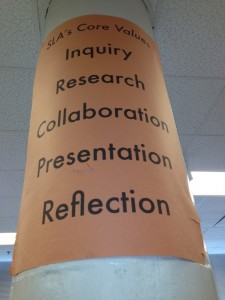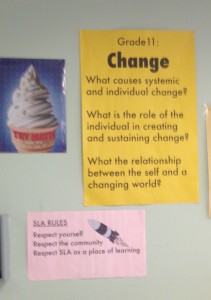Throughout the process of transitioning to the Common Core, I have been considering various approaches to supporting the depth, breadth, and nuances of the new standards. Recently, a team from my school district visited the Science Leadership Academy (SLA) in Philadelphia, PA. SLA, whose most notable contribution to the education community is EduCon, offers a unique opportunity to research the impact of Problem Based Learning (PBL). Lead by Chris Lehmann, the SLA is a magnet school within the district of Philadelphia Public Schools.
We arrived at our destination on a cold March morning. The wind was whipping through the City of Brotherly Love with such force, it made walking a few feet a chore. As I approached the building I saw High School students running by me. They dipped into the building ahead of me. Could that be their gym class? Later on I found out that it was. SLA embraces the PBL philosophy even in terms of how they utilize their limited space (no gymnasium) and resources.
Our tour guide for the day, Jeremy Spry, met us at the main office. His relaxed, almost too calm for school demeanor was both a welcoming and refreshing approach to our busy morning. He told us we would learn a lot more then just PBL on our visit. His excitement for the SLA learning environment was evident.
As we toured the building, everyone seemed to know Jeremy. He took us into a science class that was studying genetics. We were introduced to the self proclaimed “best student at SLA”. After his warm greeting (of course took a photo), he went on to describe the Punnet Square concept with such ease, it was as if he was the teacher. Ironically, after observing their collaborative presentation on the genetic disposition of Huntingdon’s Disease, it was evident the students are in the driver’s seat of their own learning.
Jeremy explained that SLA’s core values (Inquiry, Research, Collaboration, Reflection) are integrated into everything. Furthermore, SLA is very specific on the progression of learning as the students enter 9th grade (Identity), then 10th grade (Systems ) which leads into 11th grade (Change), and then culminating into a capstone project in 12th grade.
From there, we spent time in a freshman English class. There was a lively discussion about what is art and what is not art in terms of paintings, and music. I actually had to ask Jeremy who the teacher was because the students were facilitating the discussion. He pointed to the teacher, and honestly, I thought earlier that he was a student. The class conversations were reminiscent of a collegial debate type atmosphere where everyone felt they could share their differing opinions while maintaining a respectful demeanor.
When we visited the digital video editing room, students were engaged in film projects that offered an answer to a number of questions. For instance, one student told me the focus of his film was about his conspiracy theory surrounding Chap Stick. He asked me, “Does anyone ever really finish a Chap Stick?” I had to laugh because I don’t think I have. When I watched his final product, I was amazed at his production skills and thoughtful consideration of character development.
Lunch time at SLA is much different from most schools. Students hang out and eat…. wherever. Sure, there is a cafeteria, but most kids line the hall near the main office, or in out coves throughout the school. Lines are blurred, and there are often teachers who are right in there eating with the kids and discussing life’s big questions.
Our tour concluded with a sit down with the principal and SLA founder, Chris Lehmann. He told us that the school may seem unorganized from an outsiders perspective, but that SLA flourishes because it stays true to the core values. Chris doesn’t look for mavericks at SLA because he knows that most were at their prior teaching positions, but at SLA it is incumbent for everyone to be going in the same direction. Chris rarely suspends students, sees no need for a traditional dress code, and encourages his students to be treated as adults, as equals. Chris truley cares about his students. While we were talking, Chris had to balance being a host to us, and the sign ups for the Ultimate Frisbee team he organizes, and a student who was upset about something. His door was open the entire time, and anyone had access.
The visit to SLA was heavy. On the way home, I felt inspired by our experience because I believe our students can benefit from integrating the PBL philosophy into our own learning environment. As we continue our transition to the common core, I now have resources and experiences that can help our teachers and students dig deeper in the curriculum.





